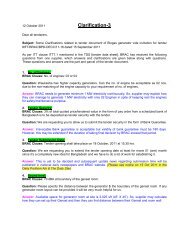Combining health and social protection measures to reach the ultra ...
Combining health and social protection measures to reach the ultra ...
Combining health and social protection measures to reach the ultra ...
- No tags were found...
Create successful ePaper yourself
Turn your PDF publications into a flip-book with our unique Google optimized e-Paper software.
Research resourcesThe need <strong>to</strong> developresearch capacityArticle by Mary Ann D Lansang (pictured) <strong>and</strong> Rodolfo J DennisThe need for <strong>health</strong> research capacity streng<strong>the</strong>ning(RCS) is widely recognized as a major unmet need,particularly in low- <strong>and</strong> middle-income countries(LMICs) 1,2,3,4 . Despite revolutionary advances in <strong>health</strong>research, science <strong>and</strong> technology, <strong>health</strong> gains among <strong>the</strong>poor continue <strong>to</strong> lag far behind <strong>the</strong> pace of <strong>health</strong>improvement among <strong>the</strong> wealthy. RCS efforts, which havebeen largely uncoordinated <strong>and</strong> inadequately funded, haveyet <strong>to</strong> make a significant impact on addressing <strong>the</strong> wideninginequities in <strong>health</strong> <strong>and</strong> <strong>health</strong> human resources.Recent global, regional <strong>and</strong> national developments havemade <strong>the</strong> agenda of RCS all <strong>the</strong> more important <strong>and</strong> urgent.Moreover, new challenges for RCS have emerged as a resul<strong>to</strong>f <strong>the</strong>se developments. In response, three internationalbodies – <strong>the</strong> Council on Health Research for Development(COHRED), <strong>the</strong> Global Forum for Health Research, <strong>and</strong> <strong>the</strong>Special Programme for Research <strong>and</strong> Training in TropicalDiseases (TDR) – agreed <strong>to</strong> collaborate, in order <strong>to</strong> support<strong>and</strong> <strong>to</strong> improve <strong>the</strong> performance of national <strong>health</strong> researchsystems, particularly in LMICs 5 . In this paper, we reviewrecent developments <strong>and</strong> discuss <strong>the</strong> implications <strong>and</strong>opportunities for strategic action for streng<strong>the</strong>ning researchcapacity.Recent trends influencing <strong>health</strong> RCSTo determine <strong>the</strong> opportunities <strong>and</strong> strategies for RCS in <strong>the</strong>future, it is necessary <strong>to</strong> track new developments that arelikely <strong>to</strong> affect RCS initiatives. Key developments have beenselected from <strong>the</strong> following spheres of influence: <strong>the</strong> policyenvironment, <strong>the</strong> different research ac<strong>to</strong>rs, major <strong>health</strong>problems, <strong>and</strong> <strong>the</strong> <strong>to</strong>ols <strong>and</strong> competencies for <strong>health</strong>research.Global <strong>health</strong> policy environmentThere is strong convergence in <strong>the</strong> international communityon <strong>the</strong> importance of strong <strong>health</strong> systems in achieving <strong>the</strong>goals of improved <strong>health</strong> <strong>and</strong> alleviating poverty. Likewise,<strong>the</strong> WHO Commission on Macroeconomics <strong>and</strong> Health, <strong>the</strong>countries resolving <strong>to</strong> achieve <strong>the</strong> UN MillenniumDevelopment Goals (MDGs), <strong>and</strong> <strong>the</strong> Global Fund <strong>to</strong> fightAIDS, Tuberculosis <strong>and</strong> Malaria have underscored <strong>the</strong> needfor <strong>health</strong> research <strong>to</strong> support <strong>the</strong> goals of <strong>health</strong> <strong>and</strong>development. This was reiterated in November 2004 bydelegates at <strong>the</strong> Ministerial Summit on Health Research <strong>and</strong>Forum 8 in Mexico City, even as <strong>the</strong>y recognized <strong>the</strong> limitedcapacity in LMICs <strong>to</strong> tackle <strong>the</strong> research agenda fordevelopment 3,4 .Funds for <strong>health</strong> researchResource flows for <strong>health</strong> research significantly increasedfrom US$ 84.9 billion in 1998 <strong>to</strong> US$ 125.8 in 2003.However, it has been difficult <strong>to</strong> track how much of <strong>the</strong> global<strong>health</strong> research funds go <strong>to</strong> RCS. International <strong>health</strong>research (IHR) has been used as a proxy for RCS. Thisconsists largely of official development assistance (ODA) <strong>to</strong>build <strong>and</strong> streng<strong>the</strong>n “<strong>health</strong> research for development” <strong>and</strong>has seen a moderate increase in funding from 1998 <strong>to</strong> 2001,with fur<strong>the</strong>r increases projected until 2006, notably from <strong>the</strong>USA, UK, France, Italy <strong>and</strong> Germany 6 .In 2003, a notable research programme with a sizeableRCS component was launched by <strong>the</strong> European Commission:<strong>the</strong> European & Developing Countries Clinical TrialsPartnership (EDCTP). This long-term programme has initiallyobligated a <strong>to</strong>tal of €600 million for 2003–2007 <strong>to</strong> developnew interventions against HIV/AIDS, malaria <strong>and</strong> TB, with<strong>the</strong> collaboration of European <strong>and</strong> African scientists. In recentyears, <strong>the</strong> private not-for-profit sec<strong>to</strong>r, led by <strong>the</strong> Bill &Melinda Gates Foundation, has also increasingly caught <strong>the</strong>attention <strong>and</strong> imagination of <strong>health</strong> researchers with itstargeted <strong>and</strong> high-stakes approach <strong>to</strong> selected IHR initiativessuch as <strong>the</strong> Gr<strong>and</strong> Challenges in Global Health <strong>and</strong> <strong>the</strong> GlobalHIV/AIDS Vaccine Enterprise.The steady increases in funds for IHR are potentialopportunities for RCS. However, since <strong>the</strong> bulk of <strong>the</strong> hugeIHR grants are coursed through scientists <strong>and</strong> institutionsfrom High-income countries (HICs), national <strong>health</strong> researchsystems <strong>and</strong> researchers in LMICs need <strong>to</strong> be streng<strong>the</strong>ned <strong>to</strong>negotiate fairly <strong>and</strong> squarely throughout <strong>the</strong> research process.Emerging public <strong>health</strong> problemsInfectious diseases, nutrition <strong>and</strong> child <strong>and</strong> maternal <strong>health</strong>continue <strong>to</strong> be major public <strong>health</strong> concerns in LMICs <strong>and</strong>among <strong>the</strong> poor in HICs. But epidemiological trends in LMICswarn against equally disastrous consequences in morbidity<strong>and</strong> mortality from cardiovascular diseases, diabetes mellitus<strong>and</strong> o<strong>the</strong>r chronic diseases.Global Forum Update on Research for Health Volume 4 ✜ 123



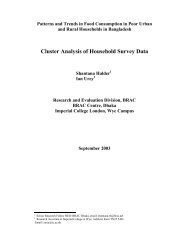
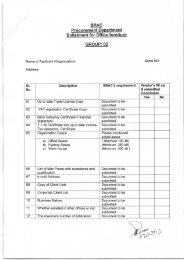
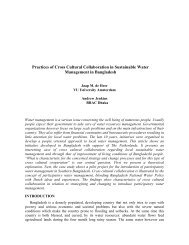
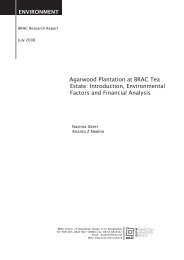
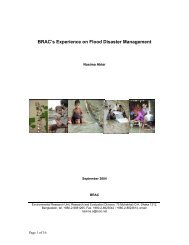
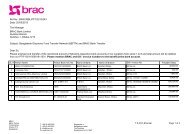
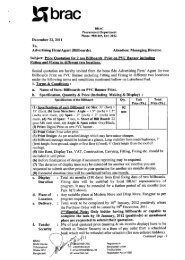
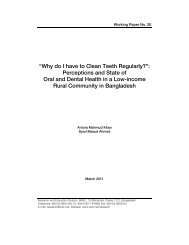
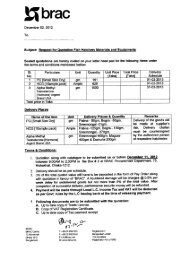

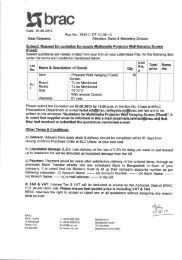
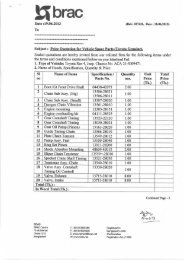
![[re-tender] RFQ for supply of Diesel Generator - Brac](https://img.yumpu.com/44421374/1/186x260/re-tender-rfq-for-supply-of-diesel-generator-brac.jpg?quality=85)
